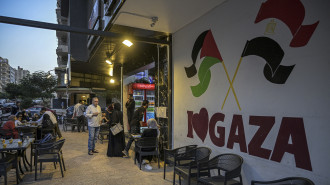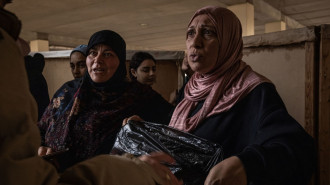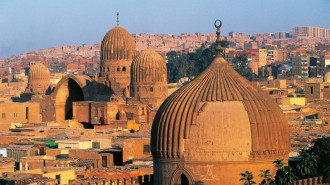
Yemenis put aside their woes to unite for Gaza and Palestine

The Israeli attack on Al Ahli Hospital in the Gaza Strip in Palestine on Tuesday was a massive shock to millions of people worldwide, particularly in Arab countries.
While Israel has been bombing neighbourhoods in the besieged enclave since October 7, the latest strike on the hospital, which was packed with displaced people, medical staff, and injured civilians, was a horrendous development that aroused the nations' utmost fury and grief.
Israel has denied pounding the hospital, but the denial has been unconvincing.
The attack on the hospital prompted mass protests in several Arab nations as thousands took to the streets and public squares, denouncing the brutal air raid on this health institution, which has neither harboured militants nor weapons.
"Our solidarity with the people of Gaza has nothing to do with religion, race, or ideology. These people are humans in the first place, and being silent on the Israel crimes is inhuman. It is disgraceful to the entire world to let such a genocide unfold"
Yemen, which has been seeing a civil conflict over the past nine years, has shifted its focus to Gaza since October 7, and Yemenis have put aside thinking and talking about their woes.
Several Yemeni provinces, including Taiz, Sanaa, Aden, Hadramout, Marib, Saada, Ibb, Al-Hudaydah, and Almahra have seen massive protests against the Israeli indiscriminate bombing of Gaza.
About one hour after the massacre in the Gaza hospital, people poured into the streets in diverse Yemeni cities, and millions of Yemenis have inundated social media platforms with photos and comments about the senseless killing of Gazans, including babies and women.
"Our solidarity with the people of Gaza has nothing to do with religion, race, or ideology. These people are humans in the first place, and being silent on the Israel crimes is inhuman. It is disgraceful to the entire world to let such a genocide unfold," said Waleed Shamsan, a 34-year-old resident in Sanaa.
|
|
Speaking to The New Arab while holding the Palestinian flag, Shamsan said that the pro-Palestine protests in Yemen will not stop as long as the bloodshed in Gaza continues.
"Now we use peaceful means to denounce this injustice against civilians in Gaza. But if this brutality continues, an all-out war will break out. And thousands of people in Yemen, if allowed, are ready to engage in war against Israel," said Shamsan.
At least 3,785 Palestinians have been killed and 12,493 wounded in Israel's fiercest bombardment of the Gaza Strip since October 7, the health ministry in Gaza said on Thursday.
'The violence maker'
With the green light and support from the United States, Israel has relished the bombing of civilian neighborhoods in Gaza. On October 9, Israeli Prime Minister Benjamin Netanyahu said, "What we will do to our enemies in the coming days will reverberate with them for generations."
The American approval of Israeli violence against civilians has heightened the anti-American sentiments in Yemen.
Yunis Nasser, a soldier who participated in the Wednesday pro-Palestine protests in Sanaa, told The New Arab, "America claims to be a democratic state and peacemaker. However, its stance on the Israeli massacres in Gaza has proved it is a violence maker. It uses its military might and political leverage to encourage havoc, not to solve complicated questions like the Israeli-Palestinian one."
"When I raise the Palestinian flag, I feel I am saying no to injustice and colonialism. I would feel guilty if I stayed speechless or did not participate in pro-Palestine protests"
Last week, USS Gerald R. Ford (CVN-78), an aircraft carrier, arrived in the Eastern Mediterranean following the breakout of the Hamas-Israel war.
Moreover, the United States Department of Defense ordered a second carrier strike group on Saturday to the eastern Mediterranean Sea as Israel prepares to expand its Gaza operations.
"Israel alone does not seem to withstand the war for a few months, which is why America rushed to send its warships and warplanes to the region. Israel is an alien occupier in the Middle East, and enemies surround it. Its lethal use of force will not guarantee its continuation for good," said Nasser, with the Palestinian black and white scarf around his neck.
In 2014, the Houthi group, a Yemeni militant movement that took over Sanaa in 2014, propagated its slogan "Death to America, Death to Israel". Countless Yemenis had condemned the group for this slogan, saying it is "unreasonable". However, Nasser said, "Given the thousands of casualties in Gaza these days, I can say this slogan is logical."
|
|
A united stance
Yemen's warring sides, the Houthi group and the UN-recognised government have been at loggerheads since 2015. They have consistently demonstrated conflicting stances on many issues.
With the start of the Israeli bombardment of Gaza, the two sides have shown a united stance and categorically decried the Israel-created tragedy in Gaza.
On Tuesday, the Yemeni Foreign Ministry condemned "the war crimes and genocide committed by the Israeli occupation against civilians in the Gaza Strip."
The Ministry said Israel's "deliberate bombing of the Al Ahli Hospital is a crime against humanity, and the perpetrators must be punished."
Similarly, the spokesperson of the Houthi group, Mohammad Abdul Salam, said that the Israeli attack on the Al Ahli Hospital in Gaza was "genocide with American-Western cover."
He added, "There is no room for leaving the people of Gaza vulnerable to genocide, and all Islamic countries are responsible for effective and deterrent action."
Last week, Houthi movement chief Abdulmalek Al-Houthi said his group is ready to engage in the war if the US intervenes, indicating that thousands of Yemenis are willing to go to fight Israel.
In a televised speech, Al-Houthi said, "If the Americans directly intervene, we are prepared to participate through missile strikes, drone attacks, and other military options."
Palestinian flags everywhere
The Palestinian flag has been ubiquitous in multiple Yemeni cities over the past ten days. It can be seen over houses, government buildings, shops and cars. Thousands of protestors also carried thousands of Palestinian flags.
"When I raise the Palestinian flag, I feel I am saying no to injustice and colonialism. I would feel guilty if I stayed speechless or did not participate in pro-Palestine protests," Ammar Saleh, a school teacher in Sanaa, told The New Arab.
"The pro-Palestine protestors in Yemen or elsewhere do not want to eradicate the Israeli people. What we want is a solution that enables the two sides to live peacefully, side by side. No side should be permitted to apply the law of the jungle," said Saleh.
The writer is a Yemeni journalist, reporting from Yemen, whose identity we are protecting for their security
![Palestinians mourned the victims of an Israeli strike on Deir al-Balah [Getty]](/sites/default/files/styles/image_684x385/public/2024-11/GettyImages-2182362043.jpg?h=199d8c1f&itok=xSHZFbmc)


![The law could be enforced against teachers without prior notice [Getty]](/sites/default/files/styles/image_684x385/public/2178740715.jpeg?h=a5f2f23a&itok=hnqrCS4x)
 Follow the Middle East's top stories in English at The New Arab on Google News
Follow the Middle East's top stories in English at The New Arab on Google News


